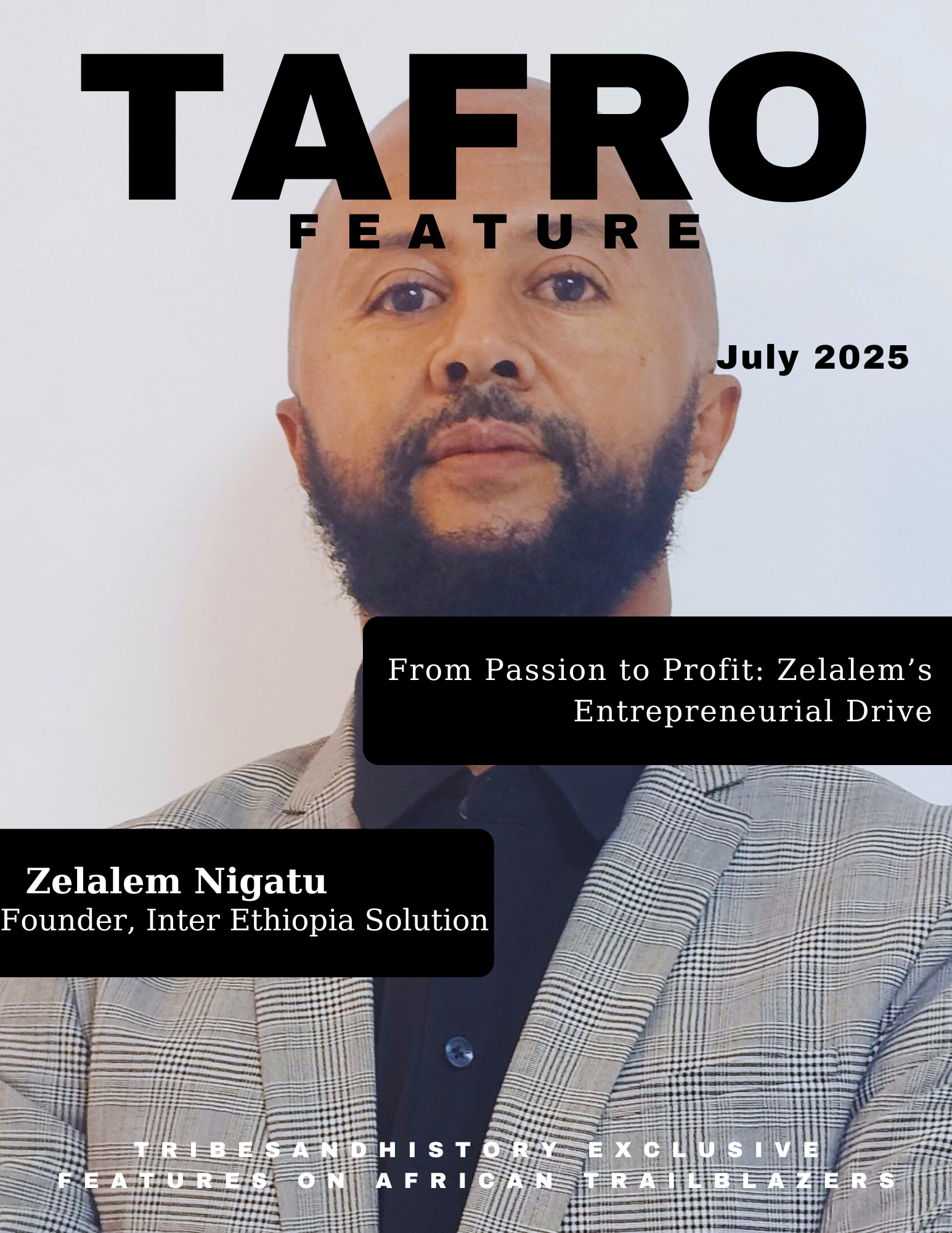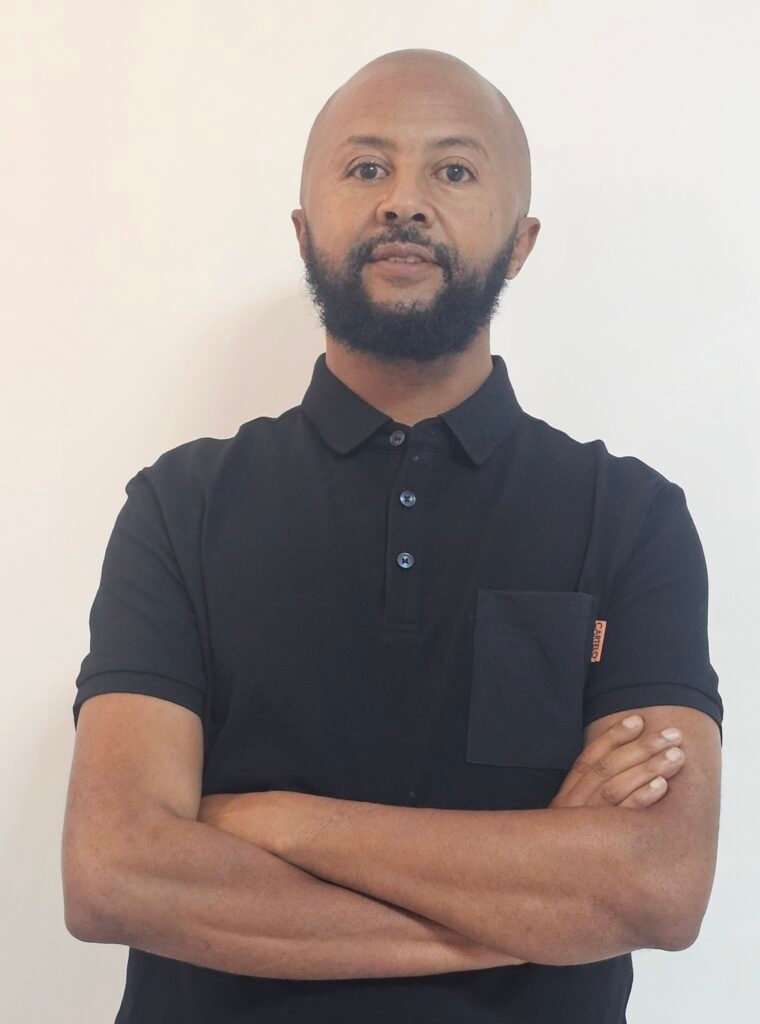
Tribes & History: First of all, what’s your name, and how would you like to be addressed?
Zelalem: My name is Zelalem Nigatu, just Zelalem is fine.
Tribes & History: Thank you, Zelalem. So, how can our readers connect with you? LinkedIn, Instagram, personal website?
Zelalem: The best way is LinkedIn, especially for professional or business connections. For family and friends, people here mostly use Facebook. For business matters, we also use company emails. But LinkedIn is the most reliable platform for reaching me.
Tribes & History: Noted. Where are you from?
Zelalem: I was born and raised in Ethiopia.
Tribes & History: Wonderful. And what do you do?
Zelalem: I started my career years ago while working with a UK-based organization that supplied refurbished computers to schools and health centers in Ethiopia. After some time, I transitioned into the renewable energy sector, particularly solar energy. I’ve been in the solar business for almost 15 years. More recently, I started a circular economy-focused e-waste management company, the more focused on lithium-ion battery and solar home systems refurbishing and repurposing.
Tribes & History: That’s impressive. What inspired you to launch your company, Inter Ethiopia Solutions?
Zelalem: Well, like I mentioned, I was in the solar industry for a long time. I’ve worked as a Sales and Country director for European and Chinese solar manufacturers, and we distributed over 200,000–300,000 solar home systems across Ethiopia. Most of these products had a lifespan of about 6 years, and now many of them no longer work. You can find these systems abandoned in backyards or warehouses. It bothered me.
So, I started thinking about how to extend the life of these products or manage the end of life. I got all the necessary e-waste management licenses and set up a small refurbishing workshop next to my solar showroom. I hired two people, bought some tools from China, and started a pilot. We collected about 800 used solar systems from one distributor and spent eight months figuring out how to repair them.
In the end, I managed to restore around 90% of them. That’s when it hit me, this wasn’t just waste, it was opportunity. I made more money refurbishing old systems than importing new ones. That’s how Inter Ethiopia Solutions, specifically the e-waste management arm, was born.
Tribes & History: That’s such a powerful shift, turning waste into value. Can you tell me more about how the business evolved?
Zelalem: After the initial pilot, I invested in a larger facility, hired more people, and imported better equipment. One of our first big projects was with d.light Solar, a well-known solar brand in Africa. We collected 19 tons of e-waste from rural areas and refurbished it. At the same time, we started applying for grants and won a few that helped us expand further.
We received business development support from a European advisory GET.invest. They helped us refine our Technical and financial model and scale up. Eventually, we secured some seed money in grant funding, and now we are preparing to raise over $1.5 million in equity investment. Now we have about 16 employees, mostly engineers and technicians, and we’re working with major international partners and other government bodies.

Tribes & History: That’s a massive impact. What does your work focus on now?
Zelalem: While we started with solar, we’ve now shifted our focus primarily to lithium batteries. Every household today uses lithium in phones, laptops, and even electric vehicles. We’re building energy stations powered by second-life batteries for rural businesses, like cold chains, irrigation systems, and supermarkets, at about half the usual cost.
Currently, we’re refurbishing about 3,000 solar home systems and 600 one-kilowatt energy stations. These systems help power homes and businesses affordably and sustainably.
Tribes & History: That’s phenomenal. When exactly did you start Inter Ethiopia Solutions?
Zelalem: The company was registered around 2018, but we started operations, especially the e-waste side, around 2021 or 2022.
Tribes & History: Wow. In just a few years, you’ve made tremendous progress. I truly applaud you.
Zelalem: Thank you. It’s been a long journey, but a meaningful one. I’ve followed these solar products from their production, to distribution, and now to collection and refurbishment. It’s a full circle.
Tribes & History: Can you share a pivotal moment in your business that shaped you as a leader?
Zelalem: Honestly, there are many. I’ve built a couple of businesses locally and internationally, but that’s another story. What defines me is that I’m not someone who waits for perfect conditions. I start small, test ideas, take risks, and use my own money. I’m not driven by activism or trends, I’m driven by opportunity.
During COVID, many of the international companies I worked with pulled out. I had no choice but to create something new. That’s when I incubated several ideas: a cooking stove business, a virtual assistant service for global clients, and e-waste management, all of which I could build without relying heavily on foreign currency.
So, I took the risk. I experimented, failed in some, succeeded in others. That mindset — to always keep building, keep testing, that’s what shaped me into the entrepreneur and leader I am today.
TribesAndHistory: So you said you have five businesses? Wow, that’s incredible. Running four at the same time, all under one roof, that’s no small feat. One thing I’ve noticed about entrepreneurs is that we never stop building. Even if one business hits a million dollars or even a billion, we keep going. We start another one. And another. I love that spirit.
Let’s dive in. How has your African heritage shaped your business journey?
Zelalem: I see myself as running an international company, not just an African one. I always try to think beyond the box, doing things that others haven’t touched yet, especially here in Africa. There’s a lot of opportunity because there isn’t as much competition. That’s why many foreigners come here and succeed, not necessarily because they’re more educated, but because they recognize the open space and act on it.
In contrast, in the U.S. or Europe, everything feels saturated. It’s more difficult to break in because so much is already built. But in Africa, there’s a vast opportunity. When I start a business, I don’t just think about my own neighborhood or country—I think bigger. Even my awards and recognitions are tied to that mindset. I want to build something reputable and scalable, not just a small shop serving one community. I want to build an empire.
TribesAndHistory: That’s a powerful perspective. Would you like to share a bit about the businesses you’ve launched?
Zelalem: Sure. I initially started four businesses together. Over time, two of them really took off. The solar energy business, especially, has grown significantly. So, I decided to focus on that. I had to pause the cooking-related business and another one because I just didn’t have the time. Right now, I’m fully invested in the two that are thriving, and they’re doing well.
TribesAndHistory: That’s amazing. Truly impressive. So, what legacy do you hope to leave for the next generation of African entrepreneurs?
Zelalem: I want to show people not to limit themselves. You have to think big. Whether you want to sell 100, 1,000, or a million products, it all starts with how you think and how you begin.
My experience is something I want to share. I hope it becomes an example for others. That’s always been my goal; maybe the timing isn’t always perfect, but I want to expose the journey and let others learn from it.
If people can see someone from their neighborhood succeed, it sparks something in them. That’s what happens in the U.S, one black basketball player makes it, and suddenly you have 100 more coming up. One baseball player breaks through, and it opens doors for others. The same can happen in Africa with entrepreneurs. The more examples we have, the more motivation we create.
TribesAndHistory: That’s so true. Interestingly, the founder I interviewed just before you said something very similar. His company is called Let’s Lead Africa, and it’s focused on training and inspiring young Africans to embrace entrepreneurship, just like what you’re talking about.
Zelalem: Exactly. I used to work in major companies in Europe. These companies had big brands, but they manufactured their products in China. I was the one designing some of those products. Yet, I didn’t own any part of the company; I was just an employee. They had the resources to set up businesses in Europe and sell those same products in Africa.
We have to stop limiting ourselves to one small area or one small community. When you explore and see others succeed, it can inspire the next person. That ripple effect matters.
TribesAndHistory: That’s incredible. So much wisdom in that. Do you have any final words or advice you’d like to leave us with?
Zelalem: Honestly, I’m much better at writing than talking. I can express myself more clearly in writing—it just flows better. So if you ever want something for publication, I’d be happy to send you something written. I’m not involved in the publishing side, but I just wanted to let you know in case it’s helpful..
TribesandHistory: Ok, before we wrap up, I want to share something with you. At Tribes and History, we’re building a WhatsApp community for African founders, those we’ve featured, and others across the continent and diaspora. The idea is to create a network where we can support each other, share resources, and collaborate.
For example, as you were speaking, I thought of another founder we featured who also works in solar energy and is based in Nigeria. I think you two would click. We’ve realized a lot of our featured founders are doing similar work and could benefit from connecting. So, would you be interested in joining this community?
Zelalem: Yes, I’d love to. That sounds like a great idea.
TribesAndHistory: Amazing. We’ll keep you posted once it’s launched. Do you have any questions for me before we close?
Zelalem: No questions for now. Thank you for the opportunity. I’m happy to be part of this.